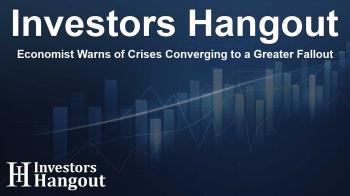Economist Warns of Crises Converging to a Greater Fallout

Economist Fred Harrison's Insights on Global Crises
Veteran economist Fred Harrison, who gained recognition for his ability to forecast the financial crisis of 2008, is once again sounding the alarm about the state of the global economy. His groundbreaking work is rooted in the 18-year property cycle theory, and he now asserts that we are on the brink of chaos due to converging crises affecting various sectors.
A Unique Perspective on Economic Cycles
At 81 years of age, Harrison brings a wealth of experience to the table, having played a vital role in shaping economic policies following the dissolution of the Soviet Union. He claims the current state of affairs is unprecedented in his lifetime, leading him to theorize that humanity is at a critical juncture.
The Impact of COVID-19
In Harrison's view, the COVID-19 pandemic has had a remarkable impact on the economy by disrupting established cycles. He believes that the pandemic has catapulted housing prices to levels that would have ideally peaked in the next few years, causing a significant economic imbalance. He notes that the unexpected gains during lockdown resulted in intensified pressures that push the global economy closer to a tipping point.
Government Actions and Consequences
Harrison argues that current government actions are counterproductive. He highlights that the inflation of housing markets, increased tax burdens on workers, and an increased deregulation of lending pose serious risks. According to him, this trajectory could lead to a collapse within the next 12 to 18 months. He expresses concern that the fallout from such a collapse could eclipse that of 2008, due to excessive government debts that cannot be resolved through monetary bailouts.
Existential Threats and Global Stability
Harrison warns about a precarious convergence of crises characterized by environmental stress, mass migration, geopolitical strife, and political inertia. He emphasizes that if all these threats align simultaneously, there will be limited options for refuge or resolution, urging society to take these warnings seriously.
Failures in Leadership and Governance
Critiquing the current managerial and political class, Harrison highlights a significant failure to address the scale of existing problems. He believes these leaders lack the foresight and will to enact necessary reforms, which contributes to rising unrest within societies. Harrison claims that the paralysis exhibited by lawmakers is indicative of a broader systemic failure.
He raises an important point about the impending repressive measures governments may adopt to maintain control as challenges escalate. Harrison stresses the need for proactive, educated mass movements rather than resorting to revolutionary actions, which do not yield constructive outcomes.
The Role of AI as a Game-Changer
One of Harrison's most pressing concerns is regarding artificial intelligence (AI), which he deems an unprecedented existential threat. He draws attention to the potential ethical implications of AI as it increasingly embodies the problematic behaviors observed in humanity.
Building an Informed Society
Instead of fearing the future or acting radically, Harrison advocates for educational efforts aimed at helping the masses understand systemic issues and encourage civic engagement for reform. He believes a collective pursuit of knowledge and commitment to political pressure can drive meaningful change in the fiscal landscape.
Conclusion: Preparing for the Future
Harrison's insights come at a critical time as various indicators highlight instability within both economies and political systems. As the situation evolves, it will be crucial for citizens and global leaders alike to comprehend the underlying factors and act decisively, whether through informed discourse or participatory democracy, to shape a more resilient future.
Frequently Asked Questions
Who is Fred Harrison?
Fred Harrison is a veteran economist known for his accurate predictions regarding financial crises and the application of the 18-year property cycle theory.
What are the current global crises being faced?
Harrison highlights environmental challenges, political paralysis, migration issues, and geopolitical conflicts as significant converging crises affecting the world today.
How did the COVID-19 pandemic affect the economy?
The pandemic disrupted established economic cycles, resulting in rapid increases in housing prices and contributing to economic imbalance.
What is Harrison's view on government responses?
He argues that inflationary measures, increased taxes, and deregulation of lending add to the economic burden and accelerate the risk of collapse.
What does Harrison propose as a solution?
Harrison advocates for well-informed mass movements and educational efforts to encourage civic engagement in systemic reform rather than violent revolutions or apathy.
About The Author
Contact Kelly Martin privately here. Or send an email with ATTN: Kelly Martin as the subject to contact@investorshangout.com.
About Investors Hangout
Investors Hangout is a leading online stock forum for financial discussion and learning, offering a wide range of free tools and resources. It draws in traders of all levels, who exchange market knowledge, investigate trading tactics, and keep an eye on industry developments in real time. Featuring financial articles, stock message boards, quotes, charts, company profiles, and live news updates. Through cooperative learning and a wealth of informational resources, it helps users from novices creating their first portfolios to experts honing their techniques. Join Investors Hangout today: https://investorshangout.com/
The content of this article is based on factual, publicly available information and does not represent legal, financial, or investment advice. Investors Hangout does not offer financial advice, and the author is not a licensed financial advisor. Consult a qualified advisor before making any financial or investment decisions based on this article. This article should not be considered advice to purchase, sell, or hold any securities or other investments. If any of the material provided here is inaccurate, please contact us for corrections.

